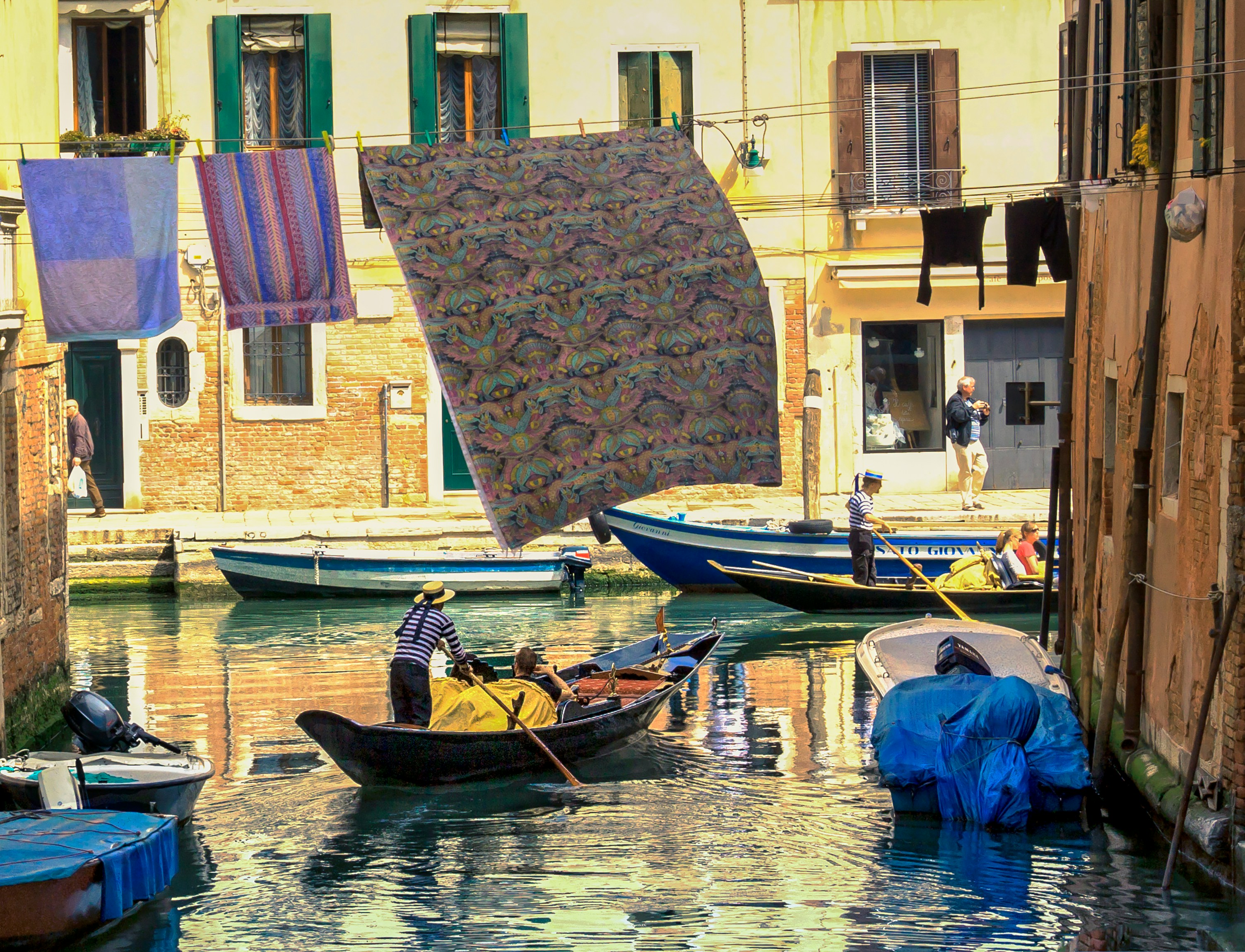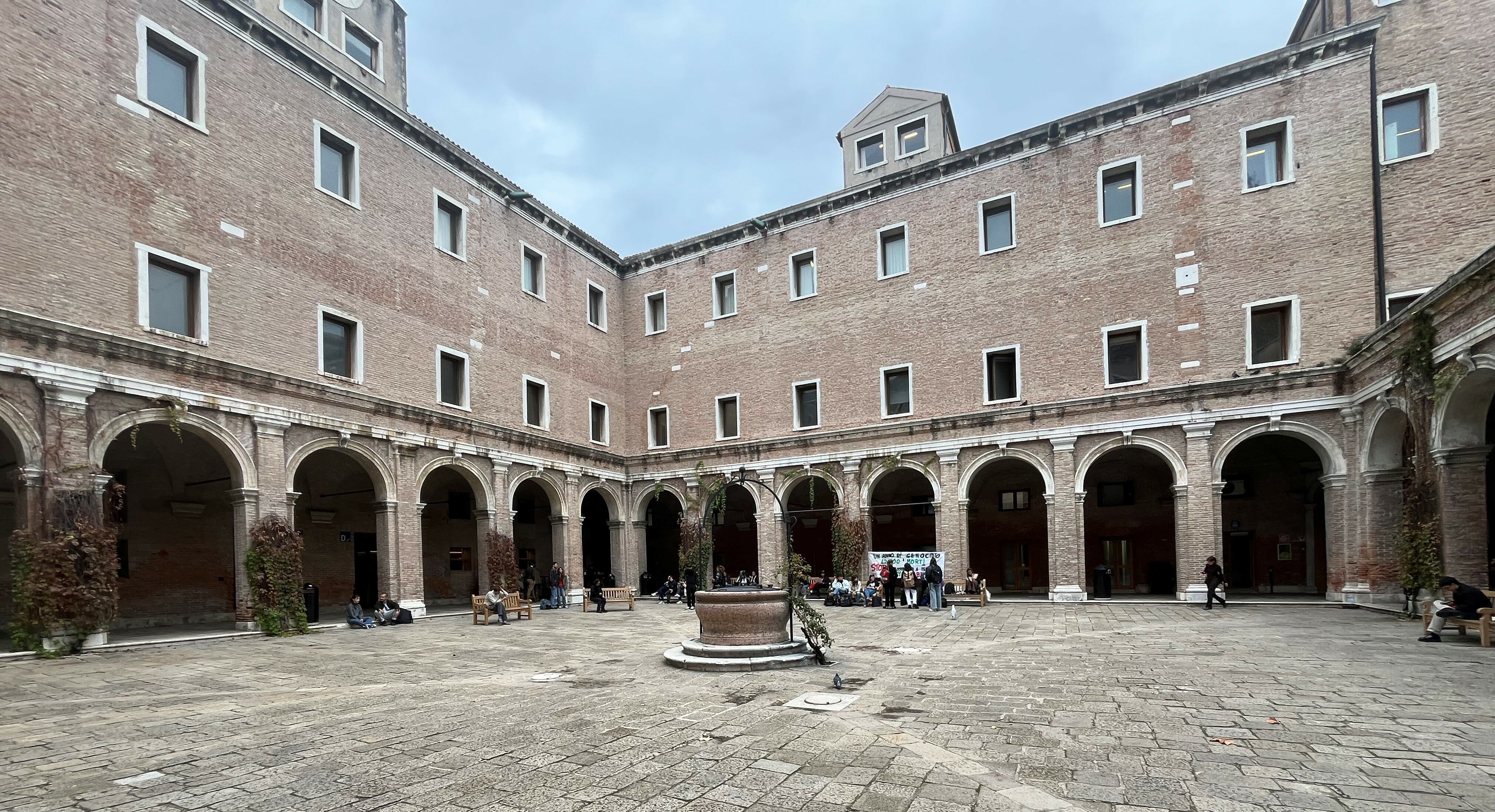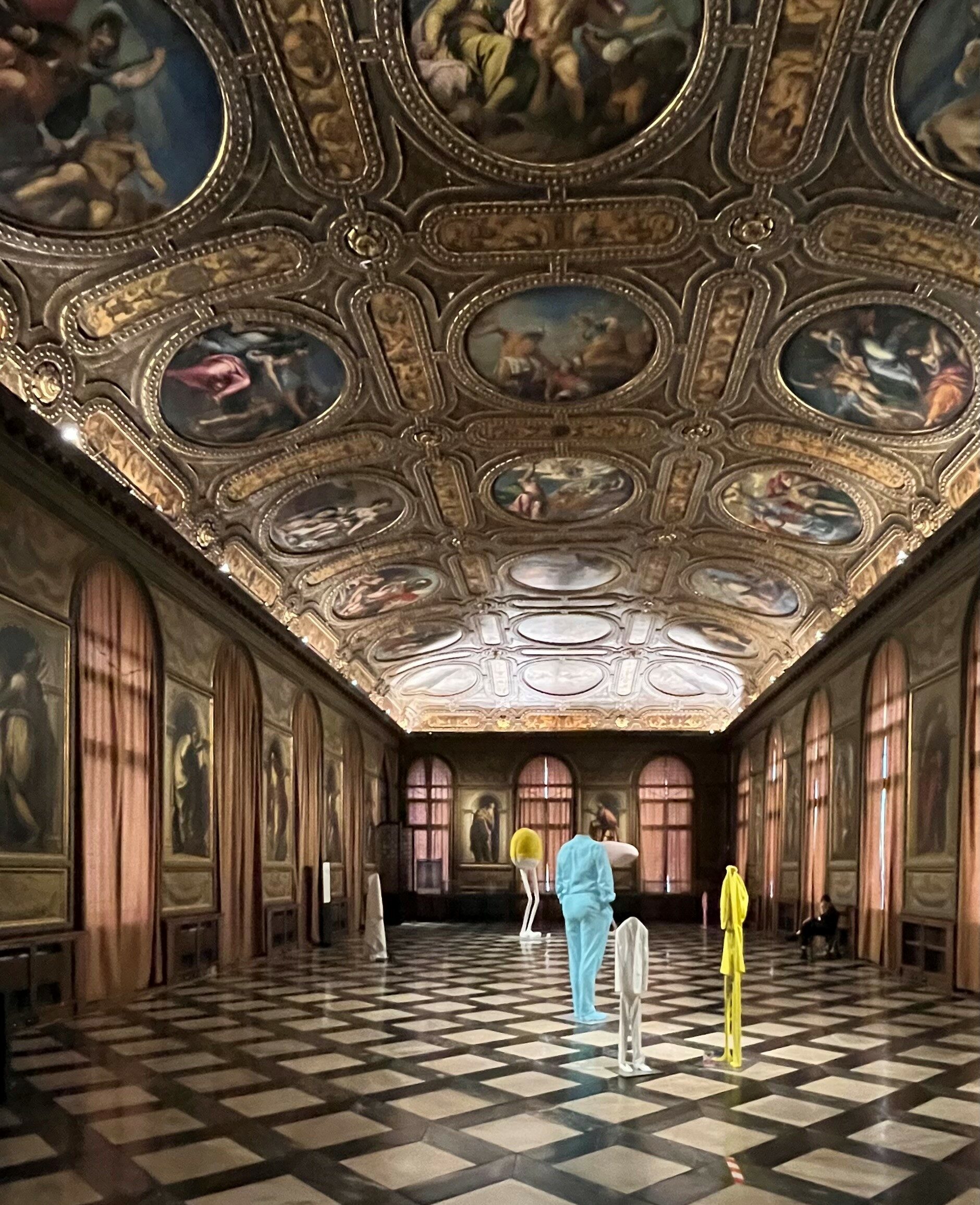In October 2024, two Laurea Information and Publishing Services experts participated in an exchange week for university library staff organised by the IUAV University of Venice through the Erasmus+ programme. In this article, we report on our key observations regarding the factors that link Laurea and IUAV: the PIONEER cooperation, the sustainability activities and the commonalities of the pedagogical approaches of our two universities.
 Photo by Sterling Lanier on Unsplash
Photo by Sterling Lanier on Unsplash
IUAV in a nutshell
Founded in 1926, Università Iuav di Venezia (IUAV) is a university in Venice where you can study architecture, urban planning, fashion and performing arts. The university has several impressive campus buildings in the historic city of Venice (IUAV 2024a.). The university library and the main campus are located in an old cotton mill on the edge of Tolentini Square, in the Santa Croce district (Figure 1).
 Figure 1. The central square of the Tolentini Campus is an atmospheric meeting place between classes. (Photo: Noora Montonen)
Figure 1. The central square of the Tolentini Campus is an atmospheric meeting place between classes. (Photo: Noora Montonen)
The IUAV has just over four thousand students, with around 160 incoming international exchange students and around 380 outgoing students each year. In total, there are about 790 members of staff (IUAV 2024a.)
Laurea and IUAV launching cooperation – what do we have in common?
Shortly after we had applied for the exchange, we received the news that the European Commission had granted a 4-year developmental funding to the PIONEER Alliance. IUAV and Laurea are both PIONEER universities. The PIONEER Alliance is a strategic partnership of 10 European higher education institutions with the aim of promoting sustainable urban development. The members of the Alliance are united by their interest in education and research, development and innovation (RDI) (PIONEER 2024). It was great for us to visit the partner university and get to know the partners at this early stage, knowing that the PIONEER Alliance will officially start its cooperation in January 2025.
Sustainable development at the heart of teaching and research
Higher education institutions have an important role to play in promoting sustainable development by training the talent of the future to find solutions to sustainability challenges (Žalėnienė & Pereira 2022). For both Laurea and IUAV, sustainable development is a cross-cutting dimension of their activities. IUAV promotes sustainable development through its research projects on sustainability, climate change, ecological transition, reconstruction of areas affected by disasters, etc. Venice is a unique environment to address cultural and urban sustainability (Gatto 2024; IUAV 2024a.).
Maria Gatto from International Services at IUAV, told about the university’s sustainability activities during the exchange week. The IUAV coordinates the Green Train Consortium project, which is part of the European Green Deal initiative. The consortium provides its members with a network for sustainability-focused cooperation, training and opportunities for sustainable international mobility. In the everyday life of the university, sustainability is visible through the recycling of books and the sale of leftover food in the name of the ”Too good to go” campaign (Gatto 2024).
At Laurea, sustainable development is promoted through education, research, development and innovation (RDI) and regional development in accordance with the Sustainable Laurea programme (Laurea 2024a). In RDI activities, all Laurea’s research programmes and cross-cutting themes have sustainable development policies and objectives in line with their areas of expertise. Projects related to sustainable development (e.g. Food Waste Ecosystem and Circular economy incubator) have addressed challenges such as promoting the circular economy and sustainable business models (Laurea 2024b).
The future PIONEER cooperation will also contribute to strengthening the sustainable development work of both partner universities. The Alliance’s activities will focus on the following goals in particular with regard to the Agenda 2030 goals: to ensure inclusive and equitable quality education and promote lifelong learning opportunities for all (4), to build resilient infrastructure, promote inclusive and sustainable industrialisation and foster innovation (9), and to make cities and human settlements inclusive, safe, resilient and sustainable (11). It is essential that the objectives are promoted through the involvement of higher education leaders, staff and students (Launikari 2024; Ministry of Foreign Affairs 2024.)
Sustainable development embedded in international mobility
IUAV’s outgoing exchange students are encouraged to choose their destinations abroad to learn more about sustainability, for example in relation to the sustainability transition. For incoming exchange students, 45% of the courses offered at IUAV are related to the theme of the study programme in line with Agenda 2030 (Gatto 2024). The aim of the PIONEER Alliance is to develop student mobility so that it is quantitatively as balanced as possible between the partner universities.
At Laurea sustainability and accountability are embedded in student exchanges. The Laurea student intranet (2024) provides students with tips on accountable exchange and sustainable travel practices. The guidelines are based on the Green Erasmus project, including a portal on sustainable exchanges (Green Erasmus 2024). For Laurea staff, the same Green Erasmus rules apply to international mobility and the staff intranet gives guidance on how to obtain green travel support for staff exchanges (Laurea Staff Intranet 2024).
The international mobility of students and staff in higher education institutions has many benefits. For students, for example, exchanges can develop language skills, increase professional confidence and improve employment opportunities. From the perspective of higher education institutions, exchanges can improve digital literacy and social inclusion, and lower discrimination (European Education Area 2024). Despite the environmental impact of student and staff mobility, it is worth noting that international exchanges can also contribute to sustainable development in the long term. For example, the experience gained from an exchange can help to learn about more efficient production methods or sustainable management models that can reduce emissions in the future (Shields 2019, 599.)
Students solve local problems
Maria Gatto (2024) warmly welcomes international exchange students to Venice to solve local problems. Problems caused by climate change, such as rising sea levels and the resulting Acqua alta tidal phenomenon, are literally flooding Venice’s streets and eroding buildings at the same time as the ground beneath Venice is sinking. Local economy is largely based on old family businesses, and those that have experienced generational change are struggling to maintain tradition, renew themselves and meet the challenges of today. An UNESCO World Heritage site of cultural and historical importance attracts masses of tourists with its architecture and unique setting, while at the same time local Venetians can no longer afford or find space to live in their own town. To address these challenges, among others, the local economy and the city need international students, while IUAV’s own students returning from exchange can benefit from what they have learned and experienced during their exchange (Gatto 2024.)
IUAV’s pedagogical approach is to involve students in real projects that develop working life and the region. This is very similar to Laurea’s Learning by Developing (LbD) model, which guides students to work independently and investigatively on local challenges and in cooperation with regional actors. In real-life projects, students, together with supervising teachers, other students and employers, have the opportunity to strengthen their professional skills, create networks and develop solutions to real-life situations (Laurea 2024c). The PIONEER cooperation, which will start in 2025, will certainly open up even wider international networks and opportunities for students to participate in Blended Intensive Programmes (BIP) of virtual and physical co-learning with students from the Alliance universities.
Key takeaways from the Erasmus+ exchange and the next steps
The exchange week in Venice was an intense and wonderful experience. With five exchange days, interesting places to visit such as the National Library Biblioteca Marciana (Fig. 2) and the Archivio Progetti, an archive focusing on architecture, and 90,000 efficient steps on foot, the main take-away of the week back home was the people: meetings and discussions with exchange colleagues and staff from the IUAV Library and International Services. Personal encounters and networking served as a starting point for international cooperation. The week showed that there is a lot of potential for cooperation with IUAV, for example in the field of sustainable development.
 Figure 2. National Library Biblioteca Marciana and works of art from the Venice Biennale (Photo: Noora Montonen)
Figure 2. National Library Biblioteca Marciana and works of art from the Venice Biennale (Photo: Noora Montonen)
The exchange week in the unique city of Venice brought a change of pace to our daily work at Laurea. We warmly encourage any expert or teacher considering an international exchange to make that experience. The international services of the universities offer support in planning your exchange and the Erasmus+ programme provides you with financial support.
Taking a step back from your own, sometimes hectic and steady professional life, helps you to see things more clearly, to bring new motivation to your work and to appreciate your own organisation and country. From the bustle of the tourist-filled streets of Venice, it was great to return to the open streets of Finland and to nature, to the clean air.
”You have to go far to see near”.
Authors
Anna Laakkonen is an expert at Laurea University of Applied Sciences, working in the Information and Publishing Services. With a focus on supporting and developing open science and research services within the university, Anna is also dedicated to promoting the use of artificial intelligence tools in scientific information searching.
Noora Montonen is an expert at Laurea University of Applied Sciences. She is the editor-in-chief of the online magazine Laurea Journal. She promotes sustainability in UAS libraries as the head of AMKIT Consortium Sustainable Development -group.
Bibliography
- European Education area 2024. International mobility and cooperation. Visited 6.11.2024. https://education.ec.europa.eu/fi/education-levels/higher-education/inclusive-and-connected-higher-education/mobility-and-cooperation
- Gatto, M. 2024. Presentation as part of the IUAV International Staff Week, October 2024.
- Green Erasmus 2024. About Green Erasmus. Visited 6.11.2024. https://www.greenerasmus.org/
- IUAV 2024a. Who we are. Visited 6.11.2024. https://www.iuav.it/en/node/184
- Launikari, M. 2024. Laurea and the PIONEER Alliance. Presentation at the opening ceremony of the academic year 2024-2025 at Laurea on 16.8.2024. Unpublished.
- Laurea 2024a. Sustainable Laurea. Visited 6.11.2024. https://www.laurea.fi/tietoa-meista/kestava-laurea/
- Laurea 2024b. Sustainable Reasearch, Development and Innovation Activities. Visited 6.11.2024. https://www.laurea.fi/tietoa-meista/kestava-laurea/kestava-tutkimus–kehitys–ja-innovaatiotoiminta-tki/
- Laurea 2024c. Learning by Developing (LbD). Visited 7.11.2024. https://www.laurea.fi/koulutus/opiskelijana-laureassa/lbd/
- Laurea Staff Intra 2024. Erasmus+ step-by-step instructions. Internal website. Visited 6.11.2024.
- Laurea Student Intra 2024. Going abroad in a sustainable, accountable and ethical manner. Internal website. Visited 6.11.2024.
- Ministry of Foreign Affairs 2024. Agenda 2030 – sustainable development goals. Visited 20.11.2024. https://um.fi/agenda-2030-kestavan-kehityksen-tavoitteet
- Pioneer 2024. Home. Visited 6.11.2024. https://pioneer-alliance.eu/
- Shields, R. 2019. The sustainability of international higher education: Student mobility and global climate change. Journal of Cleaner Production 217 (2019) 594-602. Visited 6.11.2024. https://doi.org/10.1016/j.jclepro.2019.01.291
- Žalėnienė, I. & Pereira, P. 2022. Higher Education For Sustainability: A Global Perspective. Geography and Sustainability, Vol. 3, Issue 1, March 2022, 44-45. https://doi.org/10.1016/j.geosus.2021.05.001
The source materials for this article have been searched using the Keenious AI tool.